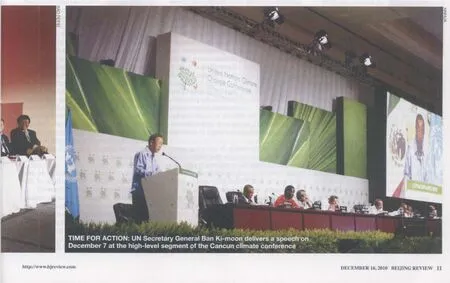Hopes and Fears in Cancun
2010-10-14ByDINGYING
By DING YING
Hopes and Fears in Cancun
By DING YING
Countries face disputes while attempting to take positive actions on climate change
The marathon-like UN Climate Change Conference in Cancun accurately reflected the difficulty of coming to a consensus on this contentious issue.Instead of reaching high-profile agreements on the unsettled questions from last year’s Copenhagen conference, participants were preoccupied with heated debates on a host of issues, including the future of the Kyoto Protocol.
China, a large developing country, set an example at the conference by promising to reduce its greenhouse gas emissions and to maintain sustainable development into the future. Analysts said eliminating the Kyoto Protocol will be disastrous to climate change discussions. It is also important for developed countries to show responsibility and take practical moves to reduce emissions based on the protocol.
Setting goals
Soon after the Cancun talks started,Japan surprised other countries, saying it will not extend the Kyoto Protocol after its fi rst commitment period expires in 2012.
“Japan will not inscribe its target under the Kyoto Protocol on any conditions or under any circumstances,” said Jun Arima,Deputy Director General for Environmental Affairs at Japan’s Ministry of Economy,Trade and Industry.
Together with Japan, Russia and Canada also opposed making commitments beyond 2012.
The reasoning was that the United States and China—two of the world’s largest emitters—are not bound by the protocol. The United States has not rati fi ed the protocol and China, as a developing country, is exempt from mandatory emission reduction targets.
Under the Kyoto Protocol, adopted in Japan in 1997, 37 industrialized countries committed themselves to cutting greenhouse gas emissions by 5.2 percent from their 1990 baseline levels by 2012.
Attempts to move beyond the Kyoto Protocol were detrimental to the Cancun conference and to climate change talks in general, said Zhou Qing’an, a researcher with the Tsinghua International Center for Communication Studies. He said the protocol is the first legally binding treaty on emission reduction in history and it should serve as a basis for future reduction targets.
Feng Zhaokui, a senior research fellow with the Chinese Academy of Social Sciences, said Japan, as the birth country of the Kyoto Protocol, showed an extremely irresponsible attitude on this issue. Japan,home to only 2 percent of the world’s population, is the planet’s fifth largest carbon emitting nation. He said Japan’s carbon emissions in 2007 were 1.37 billion tons, an 8.3-percent increase from 1990. According to its Kyoto Protocol commitment, Japan was required to trim emissions by 6 percent from the 1990 levels.
Su Wei, the chief Chinese climate negotiator, said Japan’s stance triggered a strong response from negotiators and would greatly affect the outcome of the Cancun conference. Su considers the Kyoto Protocol a key issue and thinks it is a basis for an international framework to address global warming.“It is one of the crucial issues concerning the success of the Cancun conference,” he said.
Despite Japan’s opposition to its continuation, China showed fi rm support of the landmark Kyoto Protocol.
Xie Zhenhua, head of the Chinese delegation and Vice Chairman of China’s National Development and Reform Commission (NDRC), stressed the need to protect the fruit of 20 years of climate negotiations. All parties have made historic contributions to the Kyoto Protocol, he said.
“We hope the parties finish the second commitment period negotiations and the Japanese Government continues to play a role in promoting Kyoto Protocol negotiations,” he said.
China has contributed greatly to the fi ght against climate change. In November 2009,it promised to reduce carbon dioxide emissions per unit of GDP by 40-45 percent by 2020 from the 2005 levels. Xie said China will keep its promise.
China has realized its emission reduction goal for the past fi ve years ahead of schedule and will reach its energy conservation target on time, Xie said. China’s 11th Five-Year Plan (2006-10) on national economic and social development aimed to reduce total pollutant emissions by 10 percent and energy consumption by 20 percent per 10,000 yuan($1,500) of GDP.

Now the Chinese Government is work-ing on emission reduction and energy conservation targets for the country’s 12th Five-Year Plan (2011-15).
Seeking solutions
During this year’s UN climate change talks, delegations from some 190 countries negotiated topics like the Kyoto Protocol extension, financial support, technology transfer, adaptation, forest protection and capacity building for developing countries.
Experts said some developed countries have denied the principle of “common but differentiated responsibilities” de fi ned in the Kyoto Protocol.
Zhou of the Tsinghua International Center for Communication Studies said Japan is an important developed country,and its attitude represents a regression of developed countries. Japan’s stance showed that developed countries didn’t arrive at this year’s conference sincerely hoping for reduction goals or promises.
Representatives from BASIC countries—Brazil, South Africa, India and China—made it clear during the conference that they would not support a deal until a second commitment period for the Kyoto Protocol had been established, a fast-track climate change fund had been formed and a basic technology transfer agreement had been reached.
“The Chinese delegation attended the conference with sincerity and expectation,” said the NDRC’s Xie. “We hope the conference can reach achievements on the basis of the UN Framework Convention on Climate Change(UNFCCC), the Kyoto Protocol, the Bali Road Map and the Copenhagen Accord.”
Total carbon emissions since 1750 have totaled more than 1 trillion tons, and developed countries account for more than 80 percent of that number, said a report byPeople’s Daily Overseas Edition.
By 2006, China’s cumulative per-capita carbon emissions had reached 70 tons, while that number for the United States had exceeded 1,100 tons. Now, China’s annual percapita carbon emissions are 5 tons, compared to more than 20 tons for the United States.
While countries argue over emission reduction targets, though, the climate change clock keeps ticking.
“We do not need to find solutions to all problems, but we need to make progress on all aspects,” said UN Secretary General Ban Kimoon during the Cancun conference. “The pace of human-induced climate change is accelerating. We need results now, results that curb global greenhouse [gas] emissions.”
“Nature will not wait while we negotiate,” he added. “Science warns that the window of opportunity to prevent uncontrolled climate change will soon close.”
Developed countries didn’t show adequate political will, foresight or courage on this issue, said Zou Ji, Vice President of the Institute of Environmental Economics at Renmin University of China. He explained that governments of developed countries are often held back by the political agendas of interest groups at home. In addition, the global fi nancial crisis has been the top task for most developed countries, and they can barely spare energy for the climate change issue, which is a long-term, strategic problem.
Zou pointed out that emerging economies, including China, are working on changing their economic growth pattern and adjusting their economic structure by emphasizing emission reduction and energy conservation. This attitude, he said, means there is hope in the battle against global climate change. He suggested participants of UN climate talks should fi rst focus on simple issues, like financial and technical support for developing countries.
Nearly two decades have passed since the UN Conference on Environment and Development, held in Rio de Janeiro in 1992, fi rst produced the UNFCCC, and it is impossible for countries to abandon climate change negotiations now, said Li Junfeng,Deputy Director of the NDRC’s Energy Research Institute.
Even if no agreement is reached in Cancun, China will continue to follow a path of sustainable development. Its commitment to energy conservation and emission reduction will not change, Li added.

